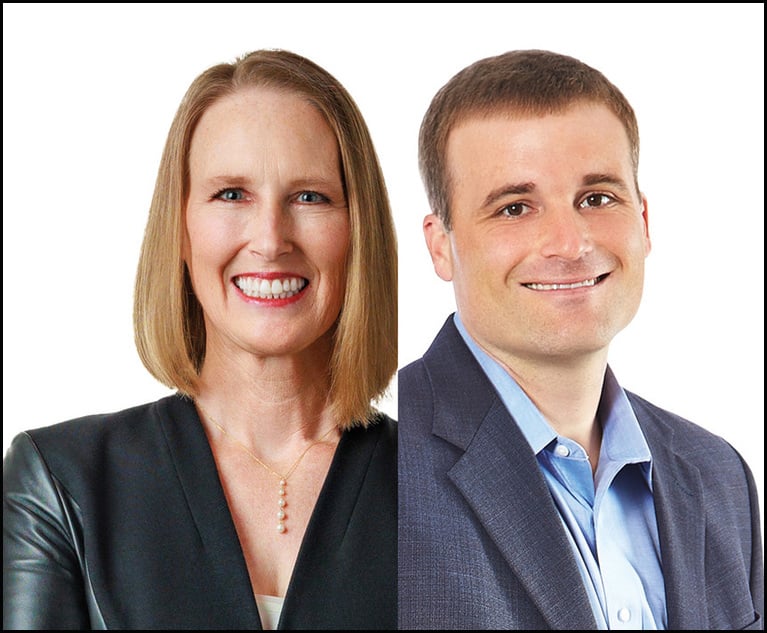Full 7th Circuit Will Rehear Age Bias Case; Decision Conflicts With 11th Circuit
The U.S. Court of Appeals for the Seventh Circuit, sitting en banc, will take up Dale Kleber's case against CareFusion Corp. The longtime attorney sued the company after he wasn't hired for a senior counsel position that included a seven-year experience cap.
June 22, 2018 at 03:57 PM
4 minute read
 AARP headquarters in Washington, D.C. Credit: Diego M. Radzinschi / NLJ
AARP headquarters in Washington, D.C. Credit: Diego M. Radzinschi / NLJ
A federal appeals court said Friday it will rehear the case of an Illinois lawyer who claimed he didn't get a job because he had too many years of experience, a dispute that tests the power of job applicants, not just current employees, to sue employers for alleged age discrimination.
The U.S. Court of Appeals for the Seventh Circuit, sitting en banc, will take up Dale Kleber's case against CareFusion Corp. The longtime attorney sued the company after he wasn't hired for a senior counsel position that included a seven-year experience cap.
A three-judge panel, ruling for Kleber in April, said the Age Discrimination in Employment Act of 1967 protects both outside job applicants and current employees. CareFusion's lawyers at Ogletree, Deakins, Nash, Smoak & Stewart had asked the full appeals court to toss the panel decision and rehear the dispute. New Jersey-based Becton, Dickinson and Co. is the parent corporation of CareFusion.
CareFusion's attorneys argued the panel decision “conflicts with multiple prior judicial decisions, creates a circuit split, threatens serious adverse consequences for employers, and is wrong on the merits.” The attorneys pointed to, among other things, an Eleventh Circuit ruling in 2016—Villarreal v. R.J. Reynolds Tobacco—that barred would-be employees from suing.
Kleber, who has more than 25 years experience in the law and business, sued CareFusion in 2015. Kleber, who was 59 then, said he was not contacted for an interview and cited the “seven-year” experience cap listed in the job posting.
The company's attorneys contend that the in-house counsel post was an “entry-level position that would have less complex job duties” and would be under the supervision of a higher-level attorney. The U.S. Chamber of Commerce, represented by Akin Gump Strauss Hauer & Feld, earlier filed a friend-of-the-court brief in favor of CareFusion.
Kleber's lawyers at the AARP Foundation had urged the appeals court to keep in place the panel's decision. They argued that disparate-impact claims under the ADEA “are just now beginning to emerge throughout the country” and that district courts in the Fifth and Ninth circuits have said job applicants could pursue age-discrimination claims.
The U.S. Equal Employment Opportunity Commission and worker-friendly advocates have trained a new focus in recent years on employment practices that can weed out older workers on the front-end. These include online applications that include required graduate dates, campus recruiting and maximum years of experience.
The number of age discrimination claims is expected to rise, with 10,000 baby boomers turning 65 every day, according to a 2010 Pew Research Center report. As of 2015, about 33 million Americans over age 55 were in the workforce, and that demographic is expected to make up a quarter of the entire U.S. labor force by 2019.
Read more:
Age Discrimination Law Protects Applicants, Not Just Employees: US Appeals Court
Hiring, Not Firing, Is a New Focus in Age Discrimination Suits
➤➤ Get employment law news and commentary straight to your in-box with Labor of Law, a new Law.com briefing. Learn more and sign up here.
This content has been archived. It is available through our partners, LexisNexis® and Bloomberg Law.
To view this content, please continue to their sites.
Not a Lexis Subscriber?
Subscribe Now
Not a Bloomberg Law Subscriber?
Subscribe Now
NOT FOR REPRINT
© 2025 ALM Global, LLC, All Rights Reserved. Request academic re-use from www.copyright.com. All other uses, submit a request to [email protected]. For more information visit Asset & Logo Licensing.
You Might Like
View All
On The Move: Energy Infrastructure Pro Joins Moore & Van Allen, Adams & Reese Changes Atlanta Leadership
6 minute read
40% Contingency: A New Ruling Just Cost This Plaintiff Team $827K in Legal Fees
6 minute read

'David and Goliath' Dispute Between Software Developers Ends in $24M Settlement
Trending Stories
- 1'It's Not Going to Be Pretty': PayPal, Capital One Face Novel Class Actions Over 'Poaching' Commissions Owed Influencers
- 211th Circuit Rejects Trump's Emergency Request as DOJ Prepares to Release Special Counsel's Final Report
- 3Supreme Court Takes Up Challenge to ACA Task Force
- 4'Tragedy of Unspeakable Proportions:' Could Edison, DWP, Face Lawsuits Over LA Wildfires?
- 5Meta Pulls Plug on DEI Programs
Who Got The Work
Michael G. Bongiorno, Andrew Scott Dulberg and Elizabeth E. Driscoll from Wilmer Cutler Pickering Hale and Dorr have stepped in to represent Symbotic Inc., an A.I.-enabled technology platform that focuses on increasing supply chain efficiency, and other defendants in a pending shareholder derivative lawsuit. The case, filed Oct. 2 in Massachusetts District Court by the Brown Law Firm on behalf of Stephen Austen, accuses certain officers and directors of misleading investors in regard to Symbotic's potential for margin growth by failing to disclose that the company was not equipped to timely deploy its systems or manage expenses through project delays. The case, assigned to U.S. District Judge Nathaniel M. Gorton, is 1:24-cv-12522, Austen v. Cohen et al.
Who Got The Work
Edmund Polubinski and Marie Killmond of Davis Polk & Wardwell have entered appearances for data platform software development company MongoDB and other defendants in a pending shareholder derivative lawsuit. The action, filed Oct. 7 in New York Southern District Court by the Brown Law Firm, accuses the company's directors and/or officers of falsely expressing confidence in the company’s restructuring of its sales incentive plan and downplaying the severity of decreases in its upfront commitments. The case is 1:24-cv-07594, Roy v. Ittycheria et al.
Who Got The Work
Amy O. Bruchs and Kurt F. Ellison of Michael Best & Friedrich have entered appearances for Epic Systems Corp. in a pending employment discrimination lawsuit. The suit was filed Sept. 7 in Wisconsin Western District Court by Levine Eisberner LLC and Siri & Glimstad on behalf of a project manager who claims that he was wrongfully terminated after applying for a religious exemption to the defendant's COVID-19 vaccine mandate. The case, assigned to U.S. Magistrate Judge Anita Marie Boor, is 3:24-cv-00630, Secker, Nathan v. Epic Systems Corporation.
Who Got The Work
David X. Sullivan, Thomas J. Finn and Gregory A. Hall from McCarter & English have entered appearances for Sunrun Installation Services in a pending civil rights lawsuit. The complaint was filed Sept. 4 in Connecticut District Court by attorney Robert M. Berke on behalf of former employee George Edward Steins, who was arrested and charged with employing an unregistered home improvement salesperson. The complaint alleges that had Sunrun informed the Connecticut Department of Consumer Protection that the plaintiff's employment had ended in 2017 and that he no longer held Sunrun's home improvement contractor license, he would not have been hit with charges, which were dismissed in May 2024. The case, assigned to U.S. District Judge Jeffrey A. Meyer, is 3:24-cv-01423, Steins v. Sunrun, Inc. et al.
Who Got The Work
Greenberg Traurig shareholder Joshua L. Raskin has entered an appearance for boohoo.com UK Ltd. in a pending patent infringement lawsuit. The suit, filed Sept. 3 in Texas Eastern District Court by Rozier Hardt McDonough on behalf of Alto Dynamics, asserts five patents related to an online shopping platform. The case, assigned to U.S. District Judge Rodney Gilstrap, is 2:24-cv-00719, Alto Dynamics, LLC v. boohoo.com UK Limited.
Featured Firms
Law Offices of Gary Martin Hays & Associates, P.C.
(470) 294-1674
Law Offices of Mark E. Salomone
(857) 444-6468
Smith & Hassler
(713) 739-1250






